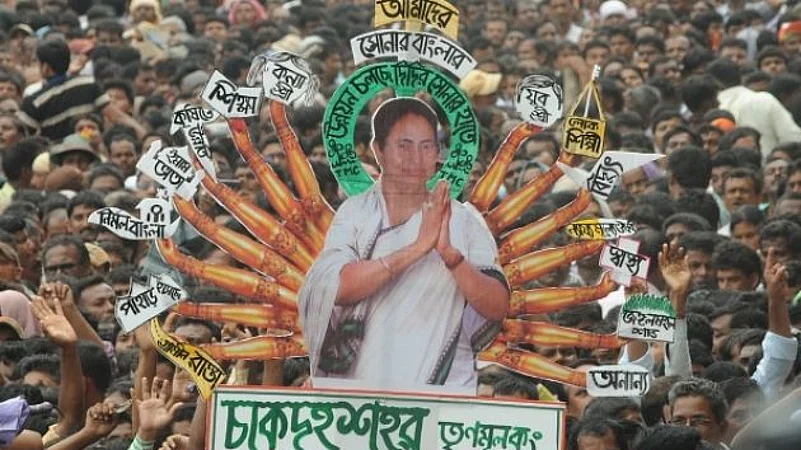Mamata: Beyond 2021
By Jayanta Ghosal
Translated by Arunava Sinha
HarperCollins India
pp.248, Rs 599
In contemporary Indian politics, every time there has been a charismatic person towering over national affairs with a pan-Indian appeal, his decline or withdrawal from public life has seen the emergence of a coalition era, with the top job going to someone who is his antithesis — an earthy regional satrap.
In 1977, it was Morarji Desai who led a rainbow Janata Party to replace Indira. In 1989, the V.P. Singh-fronted National Front was backed by both the BJP and the Left to defeat Rajiv Gandhi. Maverick P.V. Narasimha Rao’s decline resulted in the crowning of H.D. Deve Gowda and I.K. Gujral under the aegis of a United Front. Six years of Atal Bihari Vajpayee-led BJP rule was succeeded by an unstated Manmohan Singh at the head of the UPA coalition for 10 long years. Would 2024 see a repeat of 1977, 1989, 1996 or 2004? And more importantly, who among the opposition ranks has a chance to unseat the Modi-Shah duo?
Seasoned journalist Jayanta Ghosal’s ‘Mamata Beyond 2021’ (HarperCollins India) is a measured, well-researched account of a highly successful and temperamental Bengal Chief Minister Mamata Banerjee, that positions her as a credible contender for the hot seat in 2024.
Ghosal’s work is not just a sympathetic biography but goes much beyond and deeper: its analysis gives a glimpse of Banerjee’s “gameplan” and “Mission Delhi”. Apparently, she wants to shed her image as a “pro-Muslim” or Bengal-centric politician by courting the majority community and offering a national vision of development and good governance.

The Bengal CM is perhaps hopeful that after the verdict on Uttar Pradesh, Uttarakhand, Punjab, Goa and Manipur is out on March 10, 2022, there would be a realignment of political forces, particularly among the non-NDA, non-Congress parties and regional satraps. Banerjee’s biggest USP, according to the author, is her personal rapport with Sonia Gandhi, a politician among politicians. In simpler terms, if regional parties perform well in the 2024 Lok Sabha polls, Sonia and the Congress may prefer her over an Arvind Kejriwal, Akhilesh Yadav, K Chandrashekhar Rao or Nitish Kumar, purely because Mamata’s party, TMC, is Congress by another name.
In this endeavour, Banerjee is assisted by her nephew Abhishek and ace political strategist Prashant Kishor. It is tempting to quote many “juicy” passages from Ghosal’s book, but I would request discerning readers to relish these 18 chapters laced with anecdotes, cogent arguments and easy pace on their own. The journalist in him does not try to gloss over anything — be it CBI (Central Bureau Agency of Investigation) raids, the role of the Bengal governor, the Election Commission or the Muslim factor in Bengal’s politics. In Ghosal’s clinical approach towards ‘Bengalis and the BJP’ and ‘Why the BJP lost its plot (in May 2021)’, the readers get a bonus appraisal on the issue of Hinduism, Hindutva and the BJP in Bengal. Extremely well-read, Ghosal saves the readers from philosophical and ethical debates, platitudes or sermons. The absence of a comprehensive bibliography is somewhat compensated by chapter-wise notes at the end of the book.
Interestingly, Ghosal devotes an entire chapter on Abhishek, describing him as extremely sharp, media-savvy and focused on changing TMC’s image into an industry-friendly, development-oriented party devoid of a religious bias. Ghosal insists that Abhishek is not another dynast who behaves or acts as a privileged person. Instead, we get an inside view of a young man who has a 24x7 hotline to the top leadership, i.e. Banerjee herself. During the 2021 state assembly poll campaign, Abhishek attracted the largest crowds after Mamata Banerjee. His speeches and statements are always consciously and carefully drafted. As a result of which, Abhishek was seldom seen blaming the media, for instance. Ghosal says Abhishek understands modern-day politics in which public opinion is often ‘mediafied’ and events are engineered, particularly on social media.

In ‘Mamata Beyond 2021’, the Trinamool supremo, who left the Congress in 1997 due to machinations of Pranab Mukherjee, P.V. Narasimha Rao and Sitaram Kesri, comes across as an earthy and ambitious person, rather than the whimsical person that the media portrays.
Ghosal, whose access inside RSS-BJP is multi-layered and at the highest level, writes, “Many BJP and RSS leaders now believe underestimating Mamata in 2024 — as Narendra Modi and Amit Shah did in 2021 — would be a blunder. So Mamata Banerjee will have to take many more innovative steps to make herself a widely-acceptable leader who can be an alternative to Narendra Modi. Far from being inactive on this front, she is preparing quietly. Her mission ‘New Delhi 2024’ will be worth watching,” insists the author-commentator, who has himself often resisted a political role.
(Rasheed Kidwai is a journalist, author, columnist and a political analyst. He is a visiting Fellow with the Observer Research Foundation)





















